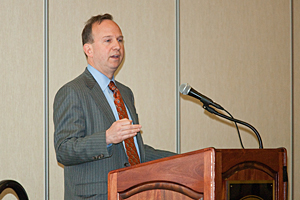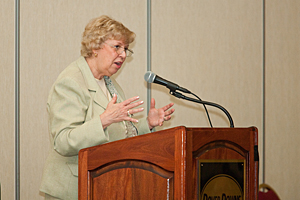

- Rozovsky wins prestigious NSF Early Career Award
- UD students meet alumni, experience 'closing bell' at NYSE
- Newark Police seek assistance in identifying suspects in robbery
- Rivlin says bipartisan budget action, stronger budget rules key to reversing debt
- Stink bugs shouldn't pose problem until late summer
- Gao to honor Placido Domingo in Washington performance
- Adopt-A-Highway project keeps Lewes road clean
- WVUD's Radiothon fundraiser runs April 1-10
- W.D. Snodgrass Symposium to honor Pulitzer winner
- New guide helps cancer patients manage symptoms
- UD in the News, March 25, 2011
- For the Record, March 25, 2011
- Public opinion expert discusses world views of U.S. in Global Agenda series
- Congressional delegation, dean laud Center for Community Research and Service program
- Center for Political Communication sets symposium on politics, entertainment
- Students work to raise funds, awareness of domestic violence
- Equestrian team wins regional championship in Western riding
- Markell, Harker stress importance of agriculture to Delaware's economy
- Carol A. Ammon MBA Case Competition winners announced
- Prof presents blood-clotting studies at Gordon Research Conference
- Sexual Assault Awareness Month events, programs announced
- Stay connected with Sea Grant, CEOE e-newsletter
- A message to UD regarding the tragedy in Japan
- More News >>
- March 31-May 14: REP stages Neil Simon's 'The Good Doctor'
- April 2: Newark plans annual 'wine and dine'
- April 5: Expert perspective on U.S. health care
- April 5: Comedian Ace Guillen to visit Scrounge
- April 6, May 4: School of Nursing sponsors research lecture series
- April 6-May 4: Confucius Institute presents Chinese Film Series on Wednesdays
- April 6: IPCC's Pachauri to discuss sustainable development in DENIN Dialogue Series
- April 7: 'WVUDstock' radiothon concert announced
- April 8: English Language Institute presents 'Arts in Translation'
- April 9: Green and Healthy Living Expo planned at The Bob
- April 9: Center for Political Communication to host Onion editor
- April 10: Alumni Easter Egg-stravaganza planned
- April 11: CDS session to focus on visual assistive technologies
- April 12: T.J. Stiles to speak at UDLA annual dinner
- April 15, 16: Annual UD push lawnmower tune-up scheduled
- April 15, 16: Master Players series presents iMusic 4, China Magpie
- April 15, 16: Delaware Symphony, UD chorus to perform Mahler work
- April 18: Former NFL Coach Bill Cowher featured in UD Speaks
- April 21-24: Sesame Street Live brings Elmo and friends to The Bob
- April 30: Save the date for Ag Day 2011 at UD
- April 30: Symposium to consider 'Frontiers at the Chemistry-Biology Interface'
- April 30-May 1: Relay for Life set at Delaware Field House
- May 4: Delaware Membrane Protein Symposium announced
- May 5: Northwestern University's Leon Keer to deliver Kerr lecture
- May 7: Women's volleyball team to host second annual Spring Fling
- Through May 3: SPPA announces speakers for 10th annual lecture series
- Through May 4: Global Agenda sees U.S. through others' eyes; World Bank president to speak
- Through May 4: 'Research on Race, Ethnicity, Culture' topic of series
- Through May 9: Black American Studies announces lecture series
- Through May 11: 'Challenges in Jewish Culture' lecture series announced
- Through May 11: Area Studies research featured in speaker series
- Through June 5: 'Andy Warhol: Behind the Camera' on view in Old College Gallery
- Through July 15: 'Bodyscapes' on view at Mechanical Hall Gallery
- More What's Happening >>
- UD calendar >>
- Middle States evaluation team on campus April 5
- Phipps named HR Liaison of the Quarter
- Senior wins iPad for participating in assessment study
- April 19: Procurement Services schedules information sessions
- UD Bookstore announces spring break hours
- HealthyU Wellness Program encourages employees to 'Step into Spring'
- April 8-29: Faculty roundtable series considers student engagement
- GRE is changing; learn more at April 15 info session
- April 30: UD Evening with Blue Rocks set for employees
- Morris Library to be open 24/7 during final exams
- More Campus FYI >>
3:53 p.m., April 24, 2009----Nearly 500 government and private sector officials and advocates gathered April 22 at the Dover Downs Hotel for the Governor's Summit on Child Poverty and Economic Opportunity, a solution-oriented conference designed for discussion and prioritization of proposed actions to reduce child poverty in Delaware.
The summit was organized by Rep. Teresa L. Schooley, D-Newark, assistant policy scientist in the University of Delaware's School of Urban Affairs and Public Policy and director of KIDS COUNT in Delaware, a program of the Center for Community Research and Service in the College of Human Services, Education and Public Policy.
Schooley chairs the state's Child Poverty Task Force, created in 2007 by executive order of former Gov. Ruth Ann Minner. The task force was charged with the goal of reducing the number of children living in poverty in Delaware by 50 percent within 10 years. Currently, an estimated 27,000 children live in poverty in the state.
“Children are 25 percent of our population but 100 percent of our future,” Schooley said. “When we retire, they will be the business leaders that keep our economy vibrant. They will be our entrepreneurs, educators and nonprofit directors. They will be the leaders that guide Delaware through the 21st century. I want Delaware's kids to be healthy, educated and prepared to take the reins. And it all starts with our commitment to them today.”
The summit commenced with remarks by Gov. Jack Markell, who emphasized the connection between child poverty and economic opportunity, and he challenged the participants to come up with action steps that will enable Delaware to be the first state to make a significant dent in child poverty levels.
“The best solution to child poverty is quality jobs,” Markell said. “My administration has been focused like a laser on getting our economy going again and getting Delawareans back to work. People deserve access to jobs where their hard work can be rewarded. Families deserve the chance to become, and remain, financially independent.”
Schooley presented Markell with the 250-page report drafted by the Child Poverty Task Force containing sobering statistics about child poverty in Delaware and more than 60 recommendations in the areas of basic needs, health care, early childhood care and education, wealth and asset building, education and employability.
The participants then engaged in a series of workshops to discuss the task force's recommendations and to prioritize those recommendations that can and should be implemented first. From the workshops, potential legislation and policy changes will be developed.
The summit also featured a panel of guest speakers moderated by Lt. Gov. Matt Denn, which included Veronica White, executive director of the New York City Center for Economic Opportunity; Mark Greenberg, director of Georgetown University's Center on Poverty, Inequality and Public Policy; and Kinsey Dinan, senior policy associate for the National Center for Children in Poverty at Columbia University. Jodie Levin-Epstein, deputy director for the Center for Law and Social Policy addressed the participants at lunch.
A common theme among the speakers was the trap of “benefit cliffs,” or the removal of public support programs once a family's income rises to a certain level, resulting in real income setbacks. Summit participants advocated exploring ways to reduce public assistance more gradually as families work their way out of poverty.
Another recommendation was to revisit how the poverty level is defined both at the federal and state level. The current definition of poverty is based on the annual cost of food, without consideration of other major expenses such as housing and childcare, which have grown more rapidly than food prices.
Support for quality childcare and for adequate pay for early childhood educators were also measures strongly supported by the attendees.
Major funding for the summit was provided by a grant from the National Governors Association. The summit was also sponsored by 25 organizations representing state and city government, businesses, labor unions and private foundations, including the University of Delaware, the College of Human Services, Education and Public Policy and the Center for Community Research and Service.
Article by Beth Chajes
Photos by Kevin Quinlan


